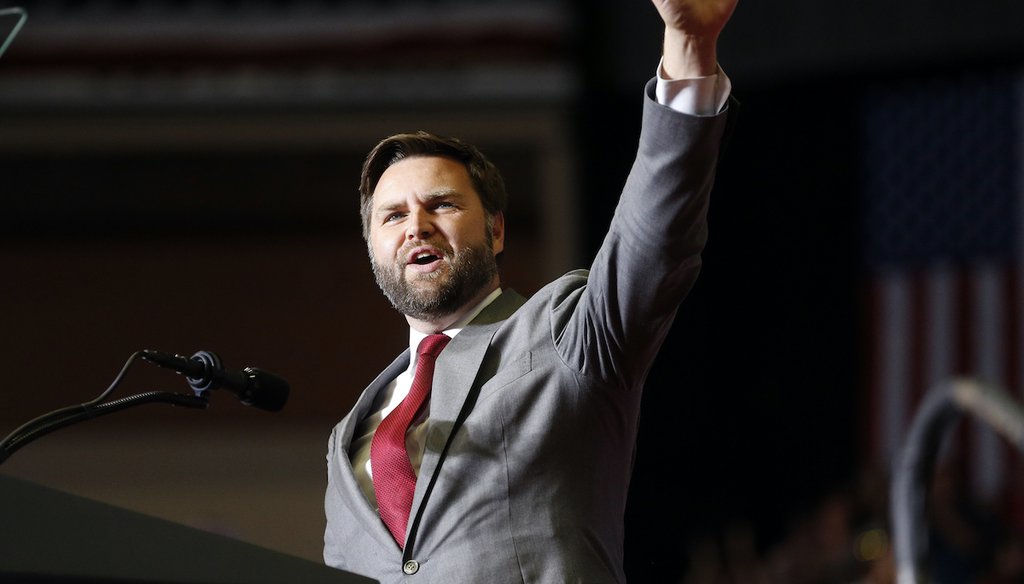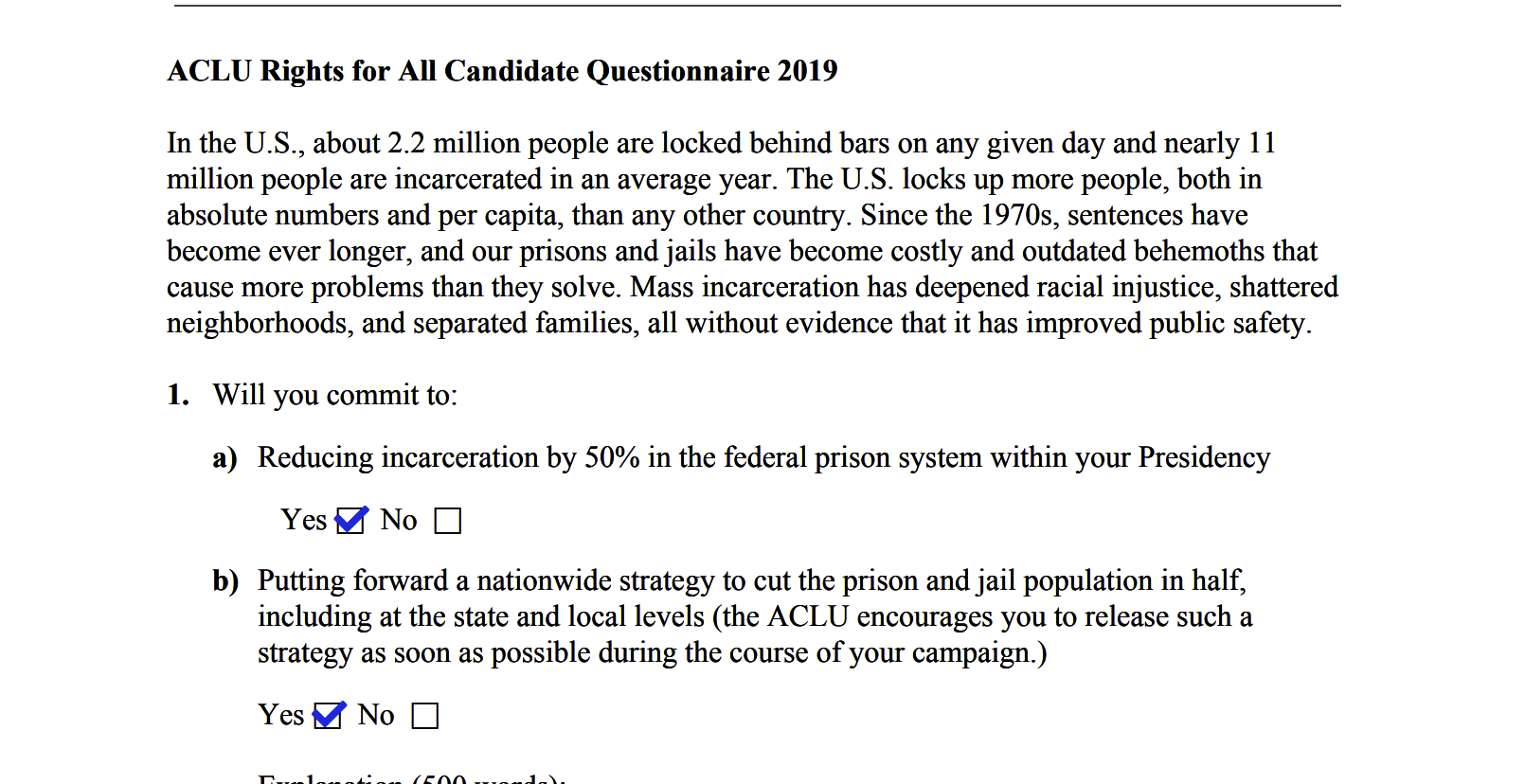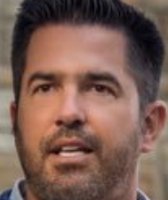Get PolitiFact in your inbox.

JD Vance, Republican candidate for U.S. Senator for Ohio, speaks at a campaign rally in Youngstown, Ohio., Saturday, Sept. 17, 2022. (AP)
J.D. Vance accused Tim Ryan of wanting to decriminalize fentanyl, but Ryan was talking about pot
If Your Time is short
- While running for president in 2019, U.S. Rep. Tim Ryan, D-Ohio, signed a pledge from the American Civil Liberties Union to reduce mass incarceration. The multiquestion pledge asked about support for legalizing drug possession, and Ryan checked the box for "no," adding that he supported marijuana legalization.
-
Ryan has consistently supported legislation that aims to reduce the flow of fentanyl.
J.D. Vance and U.S. Rep. Tim Ryan have accused each other of failing to address Ohio’s opioid crisis throughout their U.S. Senate campaign in that state.
In a TV ad, Ryan portrayed Vance’s now-shuttered nonprofit as doing little to fight opioid addiction. Vance counterpunched by suggesting Ryan’s aggression on fentanyl is new.
"Ryan wanted to decriminalize fentanyl," Vance tweeted "Now he wants it declared a weapon of mass destruction. The only difference is that three years ago he was trying to scam a different group of voters than he is today."
There is no evidence Ryan wants to decriminalize fentanyl. When we asked the Vance campaign for evidence, it cited a pledge Ryan made when he was running for the Democratic presidential nomination in 2019. But nowhere in the pledge does Ryan say he wants to decriminalize fentanyl. We tracked down that pledge and found that in response to a question about drug decriminalization Ryan said that he said the opposite.
"No, I do not support the decriminalization at the federal level of all drug possession for personal use," he wrote. He also wrote that he does agree with decriminalizing possession of marijuana.
Ryan’s record in Congress shows he has supported efforts to curb fentanyl.
Vance’s tweet is based on information in a Fox News story about a pledge the American Civil Liberties Union sought from presidential candidates in 2019. The story is headlined, "Vance calls Ryan's pledge to decriminalize 'all drug possession' a 'slap in the face' of victims' families."
The ACLU pledge was focused on reducing the prison population. It asked whether candidates would work to reduce mass incarceration by 50%.
Fox News linked to an ACLU article which listed a few strategies to reduce mass incarceration, including "ending the War on Drugs by decriminalizing all drug possession." It singled out higher-profile Democratic presidential candidates as having signed this pledge, but did not mention Ryan.
We asked the ACLU to send us Ryan’s response to its questionnaire. It showed that candidates were asked whether they would commit to cutting the federal prison population by half during their presidency and if they would publish a strategy for making it happen, including at the state and local levels. Ryan said yes to both questions.
Another question directly addressed the topic of drugs. The ACLU prefaced the question with a discussion of racial disparities in drug arrests and incarceration rates between the Black and white populations. It went on to say "the opioid crisis has reaffirmed the failure of criminalization," and "full decriminalization with appropriate treatment responses could address this stark racial injustice and reduce incarceration."
The ACLU’s question asked, "Since drug use is better addressed as a public health issue (through treatment and other programming), will you support the decriminalization at the federal level of all drug possession for personal use?"
Ryan said no. He wrote: "No, I do not support the decriminalization at the federal level of all drug possession for personal use. However, I do support the decriminalization and legalization of Marijuana."
In a September 2019 interview, an ACLU official thanked Ryan for agreeing to the mass incarceration pledge and asked Ryan how he would work toward those goals.
"Yeah, there is a lot we would have to do, and it ties into a lot of other areas," Ryan said "I would personally try to start with marijuana laws and getting marijuana off the schedule." (Under federal law, marijuana has the highest classification under the Controlled Substances Act, Schedule 1, which includes the most dangerous substances, such as heroin.)
Ryan said Black Americans face harsher sentences than white people for marijuana crimes. He did not mention fentanyl.
Featured Fact-check
When we told the Vance campaign about Ryan’s response in the questionnaire, the campaign said Ryan’s pledge to free half of the U.S. prison population would include offenders in prison for fentanyl trafficking. One 14-second clip shared on Twitter by RNC Research forwarded to us by the Vance campaign shows Ryan being asked about the pledge. Ryan said, "I don’t know if it’s by 50% or not, but we want to get all the nonviolent criminals out."
Ryan’s campaign pointed to multiple bills he co-sponsored that address fentanyl trafficking and addiction:
-
Stop Trafficking in Fentanyl Act of 2015, which would lower the drug quantity thresholds that trigger a mandatory minimum prison term for a defendant who manufactures fentanyl, distributes it or possesses it with intent to distribute.
-
STOP OD Act of 2017, which includes grants to prevent abuse of opioids.
-
Interdict Act, which requires U.S. Customs and Border Protection to increase the number of chemical screening devices to find fentanyl. President Donald Trump signed this into law in 2018.
-
Comprehensive Addiction and Recovery Act 2.0 of 2018, which reauthorizes programs for drug prevention and treatment and imposes limits on opioid prescriptions.
-
In June, Ryan introduced a resolution urging President Joe Biden and the Department of Homeland Security to designate illicit fentanyl and analogues as a weapon of mass destruction.
Drug abuse is a huge issue in Ohio. In 2007, unintentional drug poisoning became the leading cause of injury death in Ohio, surpassing motor vehicle crashes for the first time on record, according to the state health department. This trend continued through 2020. Fentanyl was involved in 81% of overdose deaths in 2020 in Ohio, often in combination with other drugs.
Vance said Ryan "wanted to decriminalize fentanyl."
Vance is referring to a pledge to reduce mass incarceration that Ryan signed during his 2019 bid for the Democratic presidential nomination.
Ryan doesn’t say anything about legalizing fentanyl. Ryan actually says the opposite.
In response to a question about his willingness to decriminalize all drug possession, Ryan wrote, "No, I do not support the decriminalization at the federal level of all drug possession for personal use." Ryan mentioned only marijuana as the drug he would decriminalize.
Ryan has supported legislation that aims to reduce the flow of fentanyl, both before and after his presidential bid.
We rate Vance’s statement Pants on Fire!
PolitiFact researcher Caryn Baird contributed to this fact-check.
RELATED: GOP Senate hopeful JD Vance paid political adviser to run nonprofit that did little to fight opioids
RELATED: Fact-checking J.D. Vance and Tim Ryan in Ohio Senate debate
RELATED: Tim Ryan on the Truth-O-Meter
RELATED: J.D. Vance on the Truth-O-Meter
Our Sources
J.D. Vance, Tweet ,Oct. 26, 2022
Fox News, Vance calls Ryan's pledge to decriminalize 'all drug possession' a 'slap in the face' of victims' families, Oct. 26, 2022
American Civil Liberties Union, Tim Ryan questionnaire, 2019
American Civil Liberties Union, We can cut mass incarceration by 50%, July 12, 2019
American Civil Liberties Union, Tweet, Aug. 1, 2019
American Civil Liberties Union, Civil liberties and the presidency with Tim Ryan, Sept. 16, 2019
American Civil Liberties Union, Clip of interview with Tim Ryan, 2019
Republican National Committee, Tweet of clip of interview with Tim Ryan, Oct. 28, 2022
Tim Ryan campaign website, Keeping Ohioans safe, Accessed Oct. 26, 2022
Congress.gov, H.Res.1172, June 2022
Plain Dealer, House passes bill that would mellow nation's marijuana laws, April 2, 2022
Rep. Tim Ryan, Tweet, March 20, 2018
Rep. Tim Ryan, Tweet, Jan. 9, 2019
Congress.gov, H.R.4183 - Stop Trafficking in Fentanyl Act of 2015, Introduced Dec. 3, 2015
Congress.gov, STOP OD Act of 2017, Feb. 21, 2017
Congress.gov, INTERDICT Act, Signed into law Jan. 10, 2018
Congress.gov, CARA 2.0 Act of 2018, Introduced March 15, 2018
Congress.gov, H.Res.1172 - Expressing that fentanyl is a weapon of mass destruction, June 13, 2022
Ohio Department of Health, Drug Overdose, Accessed Oct. 27, 2022
PolitFact’s Biden Promise Tracker, Biden announces pardon for federal simple marijuana possession, Oct. 6, 2022
Email interview, Qainat Khan, ACLU spokesperson, Oct. 26, 2022
Telephone interview, Lauren Weiner, ACLU spokesperson, Oct. 26, 2022
Email interview, Luke Schroeder, J.D. Vance campaign spokesperson, Oct. 26, 2022
Email interview, Jordan Fuja, U.S. Rep. Tim Ryan campaign spokesperson, Oct. 27, 2022
Browse the Truth-O-Meter
More by Amy Sherman
J.D. Vance accused Tim Ryan of wanting to decriminalize fentanyl, but Ryan was talking about pot
Support independent fact-checking.
Become a member!
In a world of wild talk and fake news, help us stand up for the facts.













































